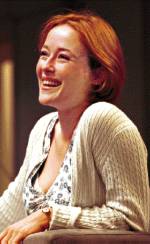
Jennifer Ehle's precise and passionate
performance is just one aspect of the
all-round excellence of The Real Thing
Photograph by Donald Cooper
from the London Times, 1/20/00
by Jeremy Kingston
When exactly it happened is hard to decide, in England probably during the 1920s, though earlier in France, but plays that treated adultery as a tragedy were superseded by others that found it an inexhaustible subject for comedy. After that turning point few playwrights explored the pains and grief of jealousy.
So when The Real Thing was premiered in 1982, Tom Stoppard's rigorous demonstration that adultery hurts was received by some critics as a revelation. One patronising response was surprise that this wittily word-spinning author was able to convey feelings, but a more creditable reaction was admiration that a modern play could again treat the matter as, so to speak, a real thing.
David Leveaux's acclaimed revival last year at the Donmar has now been restaged on the vaster stage of the Albery, prior to a Broadway transfer. The greater height, depth and width of the new space does his production no favours, and the bleakly grey panels of Vicki Mortimer's design go further in emphasising the empty air around the actors. Some of the time this scarcely matters, for the emotions rippling and then ripping through the characters occupy our close attention, but now and then the puzzling plainness of the background is a worry. Unless, of course, it is decorated to look undecorated, Mortimer's setting is calculated to express visually the cunning theatrical tricks played by Stoppard's writing.
In the first scene we see a husband wittily and coolly implying that his wife must have been unfaithful because, though she said she was off on a business trip to Switzerland, he has found her passport lying in a kitchen drawer. But in the scene that follows we discover that these are actors, performing in a play written by Henry (Stephen Dillane). The stage wife (Sarah Woodward, excellent) is his own wife, and the real wife (Jennifer Ehle) of the stage husband (Nigel Lindsay) has embarked on an affair with Henry.
Cue for clever contrasts between stage and reality? Yes and no. What happens to Henry and Charlotte, once their love becomes publicly known, bears odd similarities to what Henry imagined in his play. It is the feelings that have changed. In fact, feeling is what has arrived inside Henry. Where before he has seemed impervious to anger and the terrors of desertion, now these are more real to him than anything else in his experience. In truth, they are the real thing.
Stoppard sets this central issue amid a shrewdly chosen variety of other contrasts - good writing and bad, Bach's Air on a G String and Procul Harum's A Whiter Shade of Pale (which share the same theme) for example. Vitally, the pain that can accompany love's joy is powerfully demonstrated for us by Dillane and Ehle in the central roles.
Dillane has that rare gift of suggesting he is creating his thoughts for the first time, hitting on verbal quirks as new to him as to us. Hitting himself on his pain too, as confirmed by the gradual ravaging of his face. Ehle's vocal precision and air of fierce attention go with her luminous beauty to create an object of love as passionate and real as her lover.
This is a play in which Stoppard and his cast have brought the complexities of love and misunderstanding vividly before us.
Back to The Real Thing Article Index